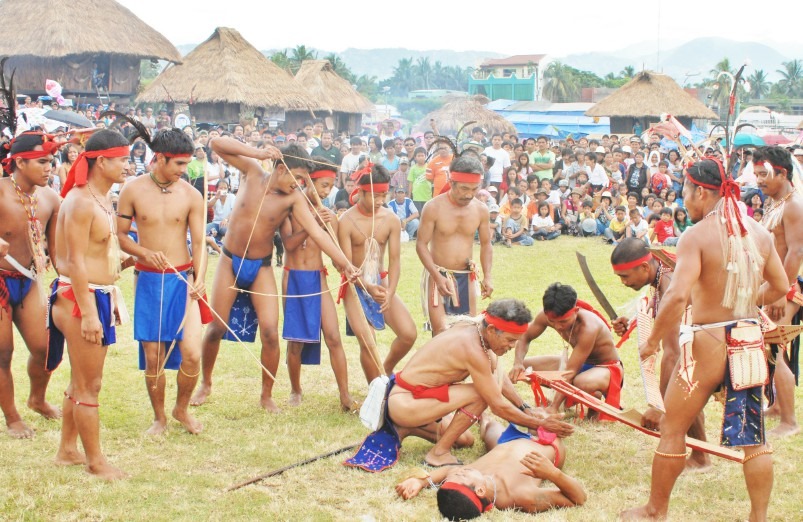
BY THE VALLEY JOURNAL
NAGTIPUNAN, Quirino (January 8)—The municipal government and the indigenous peoples (IP) community are strongly against the mining license renewal of Australian mining firm, OceanaGold (Philippines), Inc. or OGPI, for not recognizing their rights over their ancestral domain where the company operates.
The Nagtipunan municipal government led by Vice Mayor Amel Fiesta expressed support for the Bugkalot-Ilongot tribe’s claim of ancestral domain ownership over the area being mined by OceanaGold.
OceanaGold’s financial and technical assistance agreement (FTAA) is set for renewal after the company acquired a Certificate of Non-Overlap from the National Commission on Indigenous Peoples (NCIP) in Region 2 (Cagayan Valley), which denies the Bugkalots of their rights over Didipio village which host the company.
Led by its overall chieftain Rosario Camma, more than 6,000 individuals belonging to the Bugkalot-Ilongot tribe has earlier appealed to President Rodrigo Roa Duterte through a petition not to renew the FTAA of OceanaGold because of its “blatant disregard” of the ancestral domain right of the indigenous peoples (IP).
Hosting OGPI’s gold and copper project, Barangay Didipio is among the 12 villages claimed by the Bugkalot tribe in their existing application for Certificate of Ancestral Domain Title. It is also one of the contested villages particularly between Nagtipunan town of Quirino province and Kasibu town of Nueva Vizcaya province.
To support the Bugkalot-llongot tribe, the Sangguniang Bayan (Municipal Council) of Nagtipunan town also vowed to work against the issuance of a regulatory permit for OceanaGold and cease the operation of the Didipio gold and copper project.
Vice Mayor Fiesta noted that the 13 contested villages are within the territorial jurisdiction of Nagtipunan under Batas Pambansa 345, which established the municipality in 1983.
He added that the Bugkalot-Ilongot tribe had also been known to traditionally occupy these areas “since time immemorial.”
Fiesta said through Sangguniang Bayan Resolution 1, Series of 2021, the local government unit (LGU) of Nagtipunan also demands that OceanaGold should observe the social acceptability protocol under the Local Government Code of 1991.
“It is high time that the LGU of Nagtipunan should seek for accountability on the part of the mining firm, not only because it brazenly violates the ancestral domain rights of our aboriginal constituents who are the Bugkalots-llongots but also on account of OceanaGold’s adamant refusal to settle its local business taxes due to the municipality,” the Nagtipunan municipal council said.
The municipal council members’ resolution also endorsed to President Duterte a petition submitted before them by the Bugkalot-Ilongot IP communities in Nagtipunan and Kasibu town which also demanded the non-renewal of the FTAA.
Meanwhile, the Bugkalot-Ilongot tribe has criticized and condemned the NCIP’s issuance of the CNO to OGPI alleging that it is “illegally” fast-tracking the renewal of its FTAA.
Camma said the issuance of the CNO to OceanaGold by the NCIP Region 2 office in Tuguegarao City was “premature and baseless” and was “rigged without undergoing the due process” in favor of OceanaGold only to expedite the renewal and approval of the expired FTAA by the President.
Citing Section 59 of the Indigenous Peoples Rights Act or Republic Act (RA) 8371, Camma said no department, government agency or government-owned or -controlled corporation may issue a new concession, license, lease or production sharing agreement while there is a pending application for CADT.
He also cited express provisions of the ancestral domain law which state that no FTAA may be renewed by the President while there is a pending CADT application before the NCIP Commission En Banc.
According to NCIP Region 2, the issuance of the CNO, which was implemented in October last year by OceanaGold, went through a process. It is also now obtaining a renewal of financial and/or technical assistance agreement (FTAA) or a new license for the said company to operate.
President Rodrigo Duterte is just waiting for the FTAA renewal to be signed with the CNO as one of the possible grounds for approval.
In online news posted by ABS-CBN, lawyer Roderick Iquin, legal officer of NCIP Region 2 was quoted as saying that they have “a presumption of regularity” of their duties and functions in the regional office for issuing the CNO.
Iquin said they cannot be questioned about that because the application is incomplete form and substance and that they have no choice but to issue the CNO.
NCIP Region 2 also claimed that their decision on the decision issued by the ancestral domain office on October 13, 2020 in which it dismissed the certificate of ancestral domain title (CADT) application of the Bugkalot-Ilongot tribe was due to alleged lack of proof.
The NCIP took the position that the Bugkalots-Ilongots should be in occupation and possession since time immemorial and should be present in the area being claimed to be their ancestral domain.
“How can that be possible when it is popular knowledge that the Bugkalot-llongot tribe is historically the native inhabitants in the areas subject of our CADT application,” Camma said adding that they have more than a plethora of factual historical proof substantial enough to establish ancestral domain ownership over the mining areas.
“No other than mining exploration companies which declared in their reports that the areas had been first inhabited by the Bugkalot-Ilongot tribe and had traditional occupation and access for hunting, fishing, planting, among other activities in the said areas,” Camma said adding that these information were recorded by local and international historians and anthropologists in their books and researches.
He said the tribe can simply prove that the areas they are applying for CADT comprise their ancestral domain because the names of existing towns, villages, rivers, creeks, forests, trees, among others, were named by their ancestors who lived and roamed around the areas since time immemorial using their Bugkalot-Ilongot language or dialect.
